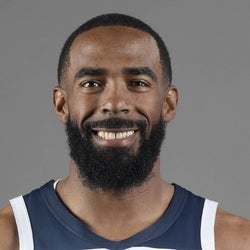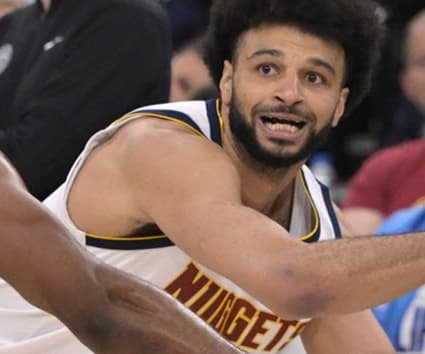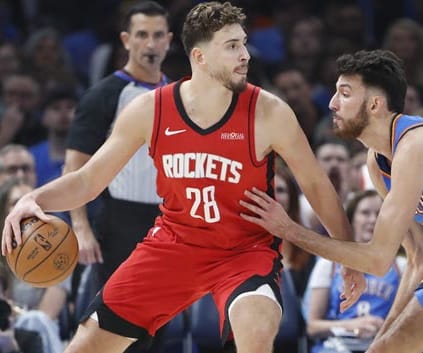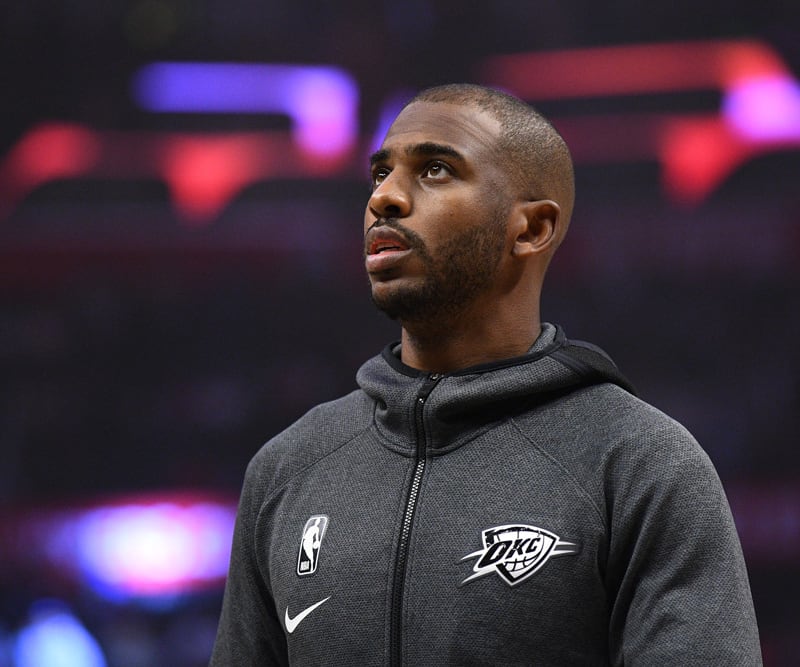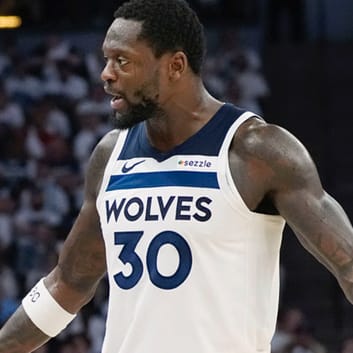2025 Stats
PTS
4.7
REB
1.8
AST
2.9
STL
0.6
BLK
0.2
ROS Projections
2025 Fantasy Outlook
Conley is coming off a 124th-place finish in eight-category leagues during the 2024-25 campaign, marking his worst fantasy performance since the 2019-20 season with Utah, in which he appeared in only 47 regular-season games due largely to a hamstring injury. The veteran point guard averaged career lows in points (8.2), usage rate (14.4 percent) and field-goal percentage (40 percent) in his 18th season in the league, and it wouldn't be surprising to see those numbers continue to dip. He also averaged 4.5 assists, 2.6 rebounds and 1.1 steals across a career-worst 24.7 minutes per game in 71 regular-season appearances. He still shot 41 percent from beyond the arc, but his 4.4 attempts per game marked his lowest since the 2015-16 season. The Timberwolves had a relatively quiet offseason aside from losing Nickeil Alexander-Walker and re-signing Naz Reid and Julius Randle, but Conley's minutes aren't expected to increase entering his age-38 season. He will also likely face competition for playing time in the backcourt from Rob Dillingham and Donte DiVincenzo. Conley is nearing the end of his career and doesn't carry much fantasy upside at this point with his usage, efficiency and assist numbers declining, but he could be a viable streaming candidate if injuries arise in Minnesota's backcourt. Read Past Outlooks

Starting sans Edwards
Conley is in the Timberwolves' starting lineup against the Warriors on Monday.
ANALYSIS
Conley will make his ninth start of the season Monday due to the absence of Anthony Edwards (foot). Conley is averaging just 18.4 minutes per game this season and hasn't scored in double digits since Nov. 19 against the Wizards.
Conley will make his ninth start of the season Monday due to the absence of Anthony Edwards (foot). Conley is averaging just 18.4 minutes per game this season and hasn't scored in double digits since Nov. 19 against the Wizards.
NBA Per Game Stats
Per Game
Total
Per 36
NBA Per Game Stats
Loading Per Game Stats...
2025 NBA Game Log
2025
2024
2023
2022
2021
2020
2019
2018
2017
2016
2025 NBA Per Game Split Stats
Schedule
By Month
Starting/Off Bench
Days Rest
Vs Opp
By Result
2025 NBA Per Game Split Stats
Loading Split Stats...
Advanced Stats
Loading Advanced Stats...
Stat Review
2025
2024
2023
2022
2021
2020
2019
2018
2017
2016
How does Mike Conley compare to other players?
This section compares his stats with all players from the previous three seasons (minimum 200 minutes played)*. The bar represents the player's percentile rank. For example, if the bar is halfway across, then the player falls into the 50th percentile for that stat and it would be considered average.
True Shooting %
52.1%
Effective Field Goal %
46.3%
3-Point Attempt Rate
74.4%
Free Throw Rate
27.5%
Offensive Rebound %
2.1%
Defensive Rebound %
8.4%
Total Rebound %
5.3%
Assist %
19.2%
Steal %
1.3%
Block %
0.8%
Turnover %
7.8%
Usage %
11.7%
Fantasy Points Per Game
12.7
Fantasy Points Per Minute
0.7
NBA Historical Fantasy Stats
Historical ADP
Loading Historical ADP...
Timberwolves Depth Chart
Our full team depth charts are reserved for RotoWire subscribers.
Subscribe Now
Timberwolves Rotation: Minutes Breakdown
Loading Timberwolves Rotation Data...
Average Fantasy Points
Minutes
FanDuel
DraftKings
Yahoo
FantasyDraft
Head2Head
Sorare
Average Fantasy Points are determined when Mike Conley was active vs. non-active during the season. Click here to view average fantasy points for a different time period.
Loading Average Minutes...
Past Fantasy Outlooks
2024
2023
2022
2021
2020
2019
2018
2017
2016
2015
2014
2013
2012
2011
2010
2009
2008
2007
Conley is in line to play his 18th season in the NBA, making him one of the most veteran players in The Association. However, his age and mileage have not limited his effectiveness, and the veteran floor general is expected to open the 2024-25 season as the Timberwolves' starting point guard despite being 37 years old by the time the campaign begins. Conley is coming off a 2023-24 season in which his scoring average dropped for the third consecutive campaign, but that's to be expected given he mainly operates as a facilitator in an offense that features Anthony Edwards and Julius Randle as go-to threats. Conley can provide decent value in other categories to compensate for the lack of scoring -- mainly the 5.9 assists per game and the 44.2 percent from three-point range he delivered in 2023-24. Some regression could be expected, especially in the shooting department, but Conley should remain a competent floor general for one of the best teams in the Western Conference. He's far from being a game-changing player, but Conley should be a decent player to target in mid-to-late rounds for managers needing a competent guard to round out a roster.
More Fantasy News

Limited to 16 minutes
Conley chipped in two points (2-2 FT), three rebounds, one assist and one steal across 16 minutes during Sunday's 111-85 loss to the Warriors.
ANALYSIS
Subscribe now to instantly reveal our take on this news.
Subscribe now to instantly reveal our take on this news.

Headed to bench
Conley will come off the bench Saturday versus the Spurs.
ANALYSIS
Subscribe now to instantly reveal our take on this news.
Subscribe now to instantly reveal our take on this news.

Scores six points in start
Conley logged six points (2-8 FG, 1-5 3Pt, 1-2 FT), one rebound, one assist and one steal in 26 minutes during Friday's 110-105 loss to the Rockets.
ANALYSIS
Subscribe now to instantly reveal our take on this news.
Subscribe now to instantly reveal our take on this news.

Starting Tuesday
Conley is in the starting lineup for Tuesday's game in Milwaukee.
ANALYSIS
Subscribe now to instantly reveal our take on this news.
Subscribe now to instantly reveal our take on this news.

Off injury report
Conley (rest) isn't listed on the injury report for Sunday's game against the Spurs.
ANALYSIS
Subscribe now to instantly reveal our take on this news.
Subscribe now to instantly reveal our take on this news.
Latest Fantasy Rumors

Candidate to be traded
Conley is one of several players who could be traded before the Feb. 5 deadline, John Hollinger of The Athletic speculates.
ANALYSIS
Conley lost his starting role, and with the Timberwolves looking to acquire another primary ballhandler and playmaker before the deadline, it seems the veteran's time in Minnesota may come to an end. Conley still has something left in the tank, though. If he's traded to a rebuilding team, he could be bought out to sign with another contender if the possibility arises.
Conley lost his starting role, and with the Timberwolves looking to acquire another primary ballhandler and playmaker before the deadline, it seems the veteran's time in Minnesota may come to an end. Conley still has something left in the tank, though. If he's traded to a rebuilding team, he could be bought out to sign with another contender if the possibility arises.


